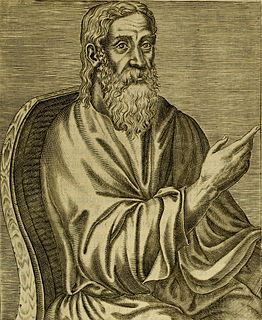A Quote by Paul the Apostle
Since therefore the children share in flesh and blood, Jesus himeself likewise partook of the same things, that through death he might destroy the one who has the power of death, that is, the devil.
Related Quotes
Death is a part of all our lives. Whether we like it or not, it is bound to happen. Instead of avoiding thinking about it, it is better to understand its meaning. We all have the same body, the same human flesh, and therefore we will all die. There is a big difference, of course, between natural death and accidental death, but basically death will come sooner or later. If from the beginning your attitude is 'Yes, death is part of our lives,' then it may be easier to face.
Death is not regarded as a natural affair by primitive man. Death is believed to be due to the intervention of some malevolent or at least not well disposed power. Normally it should not take place. So we have all through history crude explanations of death, as e.g., the influence of the serpent, the devil, sin.
While brother Joseph was referring to the provinces of God, I was led to reflect that there is no act, no principle, no power belonging to the Deity that is purely philosophical. The birth of the Saviour was as natural as are the births of our children; it was the result of natural action. He partook of flesh and blood - was begotten of his Father, as we were of our fathers.
Jesus Christ, as the first-fruit of the Kingdom, began the work of conquering death on an individual basis, but we, as His church, will be the ones to complete the task. Jesus said (Matthew 28:18), "all power is given unto me in heaven and in earth," and the church today has that same power. Death will not be conquered by Jesus returning to earth. It will be conquered when the church stands up boldly and says, "We have dominion over the earth."
There is another side to death. Whether death happens through an act of violence to a large number of people or to an individual, whether death comes prematurely through illness or accident, or whether death comes through old age, death is always an opening. So a great opportunity comes whenever we face death.
The essence of that by which Jesus overcame the world was not suffering, but obedience. Yes, men may puzzle themselves and their hearers over the question where the power of the life of Jesus and the death of Jesus lay; but the soul of the Christian always knows that it lay in the obedience of Christ. He was determined at every sacrifice to do His Father's will. Let us remember that; and the power of Christ's sacrifice may enter into us, and some little share of the redemption of the world may come through us, as the great work came through Him.
I love Death because he breaks the human pattern and frees us from pleasures too prolonged as well as from the pains of this world. It is pleasant, too, to remember that Death lies in our hands; he must come if we call him. ... I think if there were no death, life would be more than flesh and blood could bear.
We trample the blood of the Son of God underfoot if we think we are forgiven because we are sorry for our sins. The only reason for the forgiveness of our sins by God, and the infinite depth of His promise to forget them, is the death of Jesus Christ...No matter who or what we are, God restores us to right standing with Himself only by means of the death of Jesus Christ...To identify with the death of Jesus Christ means that we must die to everything that was never a part of Him.
There is no single best kind of death. A good death is one that is "appropriate" for that person. It is a death in which the hand of the way of dying slips easily into the glove of the act itself. It is in character, ego-syntonic. It, the death, fits the person. It is a death that one might choose if it were realistically possible for one to choose one's own death.
The patient endurance of the saints exhausts the evil power that attacks them, since it makes them glory in sufferings undergone for the sake of the truth. It teaches those too much concerned with a life in the flesh to deepen themselves through such sufferings instead of pursuing ease and comfort; and it makes the flesh's natural weakness in the endurance of suffering a foundation for overwhelming spiritual power. For the natural weakness of the saints is precisely such a foundation, since the Lord has made their weakness stronger than the proud devil.
































